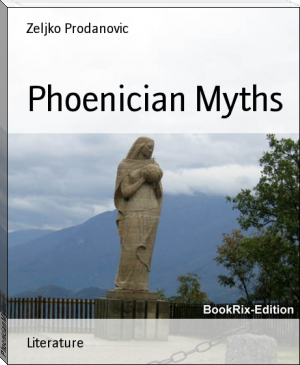The Hot Swamp - Robert Michael Ballantyne (debian ebook reader TXT) 📗

- Author: Robert Michael Ballantyne
Book online «The Hot Swamp - Robert Michael Ballantyne (debian ebook reader TXT) 📗». Author Robert Michael Ballantyne
"Get up!" he said to the one he had knocked down with his fist.
But as the order was not obeyed with sufficient promptitude, he lifted the man up by the collar, like a kitten, and sent him staggering against the tree with a violence that astounded him. Calling off the dog, he gave a similar order to the second robber, who displayed much greater agility in his movements.
Repeating the little threat with which he had dismissed their comrades, Bladud ordered them to be off. The second robber thankfully turned and took to his heels; but the first stooped to pick up his bow, whereupon Bladud wrenched it from his grasp, broke it over his head, and belaboured him with the wreck for a couple of hundred yards through the woods, while the robber ran as if he thought the evil spirit was at his heels.
Returning somewhat blown from this unusual exercise, he found the youth in a state of great amusement and satisfaction.
"Hah! you may laugh, my lad; but I can assure you it would have been no laughing matter if these scoundrels had caught you."
"You speak but the sober truth," returned the boy, still smiling; "for well assured am I that it would have cost me my life if they had caught me. But, believe me, I am not only pleased to see such villains get a little of what they deserve, but am exceedingly grateful to you for so kindly and effectually coming to my aid."
"As to that, I would aid any one in distress--especially if pursued by robbers. But, come, sit down and tell me how you fell into their power. This bout has winded me a little. I will sit down on this bank; do you sit on the bank opposite to me."
"The explanation is simple and short," replied the boy; "I wanted to have my own way, like most other boys, so I left home without leave, or saying farewell."
"That was bad," said the prince, shaking his head. He was on the point of advancing some profitable reflections on this head, but the memory of his own boyhood checked him.
"I know it was bad, and assuredly I have been well punished," returned the boy, "for these robbers caught me and have kept me with them for a long time, so long that I have quite lost count of the days now."
"Does your father live far from here?"
"Yes, very, very far, and I know not where to go or what to do," answered the boy, with a pitiful look.
"Never mind, you are safe at present, and no doubt I shall find means of having you sent safe home--though I see not the way just yet."
"Is that blood on your coat?" asked the lad anxiously, as he pointed to the prince's breast.
"It is. The arrow-heads must have gone through the breastplate and scratched the skin. I will look to it."
"Let me help you," said the boy, rising and approaching.
"Back! you know not what you do," said the prince sternly. "You must not touch me. You have done so once to-day. It may cost you your life. Ask not why, but obey my orders."
Not less surprised at the nature of these remarks than at the severe tone in which they were uttered, the boy re-seated himself in silence, while Bladud removed the breastplate and examined his wounds.
They were deeper than he had imagined, the three arrow-heads being half imbedded in his flesh.
"Nothing serious," he said, drawing out the heads and stanching the flow of blood with a little moss. "Come, now, I will show you my home, and give you something to eat before you tell me more of your history. You shall have a couch in one of my outhouses. Have a care as you walk with me that you do not come against me, or touch me even with a finger. My reasons you may not know, but--remember what I say."
Bladud spoke the last words with the severity that he had assumed before; then, dismissing the subject, he commented on the beauty of the landscape, the wickedness of robbers, the liveliness of animated nature and things in general with the cheerful air that had been habitual to him before he was compelled to flee the face of man. The pleasure he had felt in his brief intercourse with the gruff hunter of the Swamp had remained a bright spot in his lonely life. He naturally enjoyed with much greater zest the company of the lively boy who had thus unexpectedly crossed his path, but when he retired for the night--having told the lad to make for himself a couch in the fire-wood hut--the utter desolation of his life became, if possible, more deeply impressed on him.
During the night his wounds inflamed and became much more painful, and in the morning--whether from this cause or not, we cannot say--he found himself in a high fever.
His new friend, like most healthy boys, was a profound sleeper, and when the time for breakfast arrived he found it necessary to get up and awake him.
"Ho! lad, rise," he cried at the entrance to the firewood hut, "you slumber soundly. Come out and help me to get ready our morning meal."
The lad obeyed at once.
"What is your name?" he asked, as the lad appeared.
"Cormac," he replied.
"Well, Cormac, do you roast the meat this morning. Truly, it seems that you have come just in the nick of time, for I feel so ill that my head seems like a lump of stone, and my skin is burning. It is not often that I have had to ask the aid of man in such matters. Will you get me a draught of water from the spring hard by? I will lie down again for a little."
Cormac willingly ran to a neighbouring spring and filled thereat a cup made of the bark of the birch tree, with which he returned to Bladud's hut.
"Just put it inside the door where I can reach it," shouted the prince. "Do not enter on any account."
Lifting a corner of the skin that covered the entrance, the lad placed the cup inside, and then, sitting down by the fire outside, proceeded to prepare breakfast.
When it was ready he called to Bladud to say whether he would have some, at the same time thrusting a savoury rib underneath the curtain; but the prince declined it.
"I cannot eat," he said; "let me lie and rest if possible. My poor boy, this is inhospitable treatment. Yet I cannot help it."
"Never mind me," returned Cormac, lightly. "I like to nurse the sick, and I'll keep you well supplied with water, and cook venison or birds too if you want them. I can even shoot them if required."
"No need for that," returned Bladud, "there is plenty of food laid up for winter. But don't come inside my hut, remember. It will be death if you do!"
All that day the lad sat by the fire or went to the well for water, of which his patient drank continuously. During the night the prince was very restless, and groaned a good deal, so the boy resolved to sit up and watch by the fire. Next morning Bladud was delirious, and as he could not rise even to fetch from the door the water for which he thirsted, Cormac resolved to disobey orders and risk the consequences. Entering the hut, therefore, and sitting down beside the patient, he tended him for many days and nights--taking what rest he could obtain by snatches beside the camp-fire.
CHAPTER TWENTY TWO.
THE PIGS' CURE.
It was not long before our hero recovered from his delirium. Leading, as he had been doing, an abstemious and healthy life, ordinary disease could not long maintain its grasp of him. His superabundant life seemed to cast it off with the ease with which his physical frame was able to cast aside human foes. But he could not thus shake off the leprosy.
One of the first things he did on recovering consciousness was to uncover his arm. The fatal spot had increased considerably in size. With something of a shudder he looked round his little hut, endeavouring to remember where he was and to recall recent events. He was alone at the time, and he fancied the fight with the robbers and rescue of the boy must have been all a dream. The name Cormac, however, puzzled him not a little. Many a time before that had he dreamed of vivid scenes and thrilling incidents, but never in his recollection had he dreamt a name!
Being thoughtfully disposed, he lay meditating listlessly on this point in that tranquil frame of mind which often accompanies convalescence, and had almost fallen asleep when a slight noise outside awoke him. The curtain-door was lifted, and Cormac, entering, sat quietly down on a block of wood beside him.
Bladud became suddenly aware that he had not been dreaming, but he did not move. Through his slightly opened eyelids he watched the lad while he mixed some berries in a cup of water. As he lay thus silently observant, he was deeply impressed with the handsome countenance of his nurse and the graceful movements of his slight figure.
Presently the thought of his disease recurred to him--it was seldom, indeed, absent from his mind--and the strict injunctions which he had given to his young companion.
"Boy!--boy!" he cried suddenly, with a vigour that caused the boy to start off his seat and almost capsize the cup, "did I not forbid you to enter my hut or to touch me?"
At first Cormac looked alarmed, but, seeing that a decided change for the better had taken place in his patient, his brow smoothed and he laughed softly.
"How dared you to disobey me?" exclaimed Bladud again in stern tones.
"I dared because I saw you were unable to prevent me," returned the lad, with a quiet smile. "Besides, you were too ill to feed yourself, so, of course, I had to do it for you. Do you suppose I am so ungrateful to the man who saved my life as to stand aside and let him die for want of a helping hand? Come, now, be reasonable and let me give you this drink." He approached as he spoke.
"Keep off!--keep off, I say," shouted the prince in a voice so resolute that Cormac was fain to obey. "It is bad enough to come into my hut, but you _must not_ touch me!"
"Why not?--I have touched you already."
"How! when?"
"I have lifted your head many a time to enable you to drink when you could not lift it yourself."
A groan escaped Bladud.
"Then it is too late! Look at this," he cried, suddenly uncovering his arm.
"What is that?" asked the boy, with a look of curiosity.
"It is--leprosy!"
"I am not afraid of leprosy!"
"Not afraid of it!" exclaimed the prince, "that may well be, for you have the air of one who fears nothing; but it will kill you for all that, unless the





Comments (0)